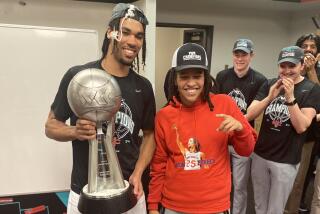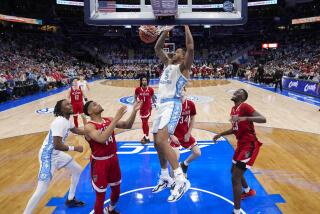Miracle Business Alive at Kansas : They Win Despite Sanctions, Loss of Manning and Coach
- Share via
WASHINGTON — Suspend your sense of reality and come with us, not to Oz but to the University of Kansas, still in the miracle business months after its unlikely triumph in last spring’s National Collegiate Athletic Assn. basketball tournament.
The 83-79 victory over Oklahoma that ended the 1988 season was the last we were supposed to have seen of the Jayhawks for years to come; the NCAA’s decision to put the school on three years’ probation for recruiting violations took care of that. The sanctions deprived the school of the chance to defend its championship, but most had already figured that the graduation of Danny Manning and the resignation of Coach Larry Brown would leave the Jayhawks with little shot at an intramural crown, let alone a national one.
So here are the Jayhawks, winners of 6 of their first 7 games.
“We just want to go out and win games,” said forward Milt Newton, a graduate of Washington’s Coolidge High School. “We want to show people that we can play without Danny Manning, that we should be in the NCAA tournament this year. We want people to look at us and say, ‘Yeah, Kansas, it would’ve been nice to have them back defending the championship.’ ”
Temple Coach John Chaney, whose team fell to the Jayhawks, 95-78, Saturday at Atlantic City, has become a believer.
“They’ve already answered the question of how good they are quite nicely: They’re a better ball club than last season,” Chaney said. “I think they should be in the top 10.”
The possibility of defending its title in the NCAA tournament ended in November. That was when the NCAA announced that Kansas was being punished for violations that occurred in June 1986 in connection with a “highly visible transfer” recruit, former Memphis State guard Vincent Askew, who never enrolled at Kansas. Brown had already left for San Antonio and the National Basketball Assn. by the time the sanctions were announced.
Brown has been replaced by Roy Williams, who spent the previous 10 seasons as an assistant to Dean Smith at North Carolina. It’s safe to assume that more than a little of the master has rubbed off during his tenure as an assistant, but Williams, a self-deprecating sort, is reluctant to acknowledge the connection.
“I don’t want anyone thinking that there’s anything remotely comparable about the two of us,” said Williams. “I’ve won six games -- really, I haven’t won any; the players have. I don’t think I had anything to do with any of them.
“Coach Smith has won 640 games and I assure you that he’s made a heck of a difference in a lot of them. Heck, I’ll be happy to live long enough to see 600 games, let alone win that many.”
Williams, 38, is only the seventh coach in the school’s illustrious basketball history and almost seems too nice for the mess he’s inherited. While not the first choice for the job -- “I think it’s common knowledge that the job was (Ohio State Coach) Gary Williams’ for the asking,” he admits -- his meticulous attention to detail and his unrelenting optimism may eventually prove him to be the best choice.
Each practice session begins with the players receiving a thought for the day on a piece of paper. “It’s amazing how much can get accomplished when no one cares who gets the credit,” was last Friday’s message. There’s no shortage of verbal homilies, either. But Williams, insists Newton, “has a mean streak; you just don’t see it.”
That could be one reason why, after an initial news conference in Lawrence last November -- the NCAA sanctions had been announced -- he threatened to bar from practices any local reporter who brought up the subject the rest of the season. Similarly, one isn’t quite sure if the coach is kidding when, bemoaning losing 3 high-school recruits this fall -- each citing the fear that the program would be unable to recover from its probation -- he says, “If I hear anyone else say that I’m gonna hit ‘em in the eye.”
“All I want is for them to give me a chance,” he continued. “The day that the Kansas program is dead, Roy Williams will already be in the ground. The word probation scares people to death but all it means is that the NCAA is going to monitor our program -- heck, I’m going to monitor our program. We can’t have any visitors on campus in 1989 and next year we can only have 12 players on scholarship. I don’t have that now.”
As far as most people were concerned, Kansas had only had one player for the past four years. That would be Manning, who ended the 1987-88 season as the collegiate player of the year after leading the Jayhawks to the championship. That was often phrased as “single-handedly” leading the Jayhawks to the championship, which tended, as you might imagine, to rankle some of the other players.
“Danny got all the publicity,” said Newton. “There were other people on the team who could play, but no one saw it and, if they did, they overlooked it to talk about Danny. Everyone said how hard this year would be but to be truthful it’s been easier than I expected. The people on this team came together quick.”
While the NCAA sanctions may have started the process of banding together, the camaraderie has been enhanced by other factors. One is that there are only nine scholarship players, joined by a walk-on, Brad Kampschroeder, from the junior varsity.
Kampschroeder rarely takes off his warm-up jersey but Williams isn’t hesitant about going to the bench. Each of the other nine players averages at least 17 minutes a game.
“It’s easy to sit and talk, but it’s difficult to go out and play,” said center Sean Alvarado. “Some teams like to talk, but I guess we’re a team that doesn’t make small talk. We just want to show something to people.”
More to Read
Go beyond the scoreboard
Get the latest on L.A.'s teams in the daily Sports Report newsletter.
You may occasionally receive promotional content from the Los Angeles Times.










